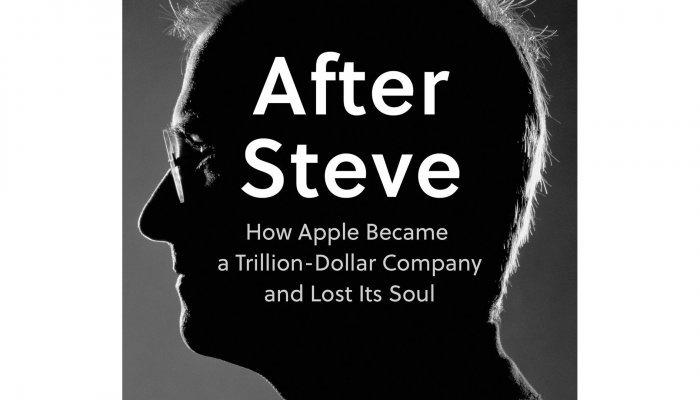After Steve
How Apple Became a Trillion-dollar Company and Lost Its Soul
Tripp Mickle
HarperCollins – R380
So what really happened at Apple after the 2011 death from pancreatic cancer of legendary founder, Steve Jobs? Wall Street Journal writer Tripp Mickle lays out an exhaustive and depressing case, which argues that although Apple has become the world’s most valuable company and a favourite of investors, it has lost the dedication to the stunning industrial design which made it so successful in the first place. Apple’s "It just works!" philosophy had at its core an obsessive search for perfection in form and detail, which applied to both hardware and software. Mickle’s thesis is that that has been replaced by dedication to operations, cash flows and profits.
On one side of the argument is another legend: British designer Jony Ive who partnered with Jobs to produce the iPod, iPhone and iPad, as well as the MacBook Air and the iMac G3. Jobs described Ive as his "spiritual partner at Apple". On the other side is the man who succeeded Jobs as Apple chief executive, Tim Cook. Mickle portrays Cook as cold, uninterested in and prepared to sacrifice design on the altar of operational efficiency and cost reduction.
Mickle’s technique is to switch back and forth from Ive to Cook, chapter after chapter. We learn about Ive’s childhood and the influence of his father, a specialist in design education. Ive comes top of his class at the prestigious Newcastle Polytechnic, one of the UK’s most sought-after vocational design schools. After a stint working in London, Ive heads to California and shortly thereafter to Apple, where he catches Jobs’ eye.
Cook grows up in the small town of Robertsdale in Alabama, before taking an engineering degree at Auburn University, followed by employment at IBM, where he also takes an MBA from Wharton. More big jobs follow on the operations side of IT companies, including Compaq, before Cook is headhunted by Apple to run its operations, which he does with ever-increasing success.
There is no doubt that the death of Steve Jobs affected Jony Ive very badly. By his own admission, he was wracked by grief. But he does return to the company and throws himself into designing Apple’s new corporate headquarters as well as the Apple Watch. Mickle argues that Cook allows Ive to become embroiled in company politics and downgrades his design team, formerly "gods" at Apple, to something altogether more prosaic. Finally, in 2019, Ive and Apple part company. Cook and the company remain, making more and more money but with questions about whether Apple will ever again be able to produce products that are "insanely great" or just further iterations of things that have gone before, like the mighty iPhone?
Mickle makes a compelling argument but I’m not sure it’s right and I wonder if he has not been seduced by the apparent narrative symmetry of "good, design-genius" Ive versus "bad, bean-counter" Cook? My central concern is something Mickle chooses to downplay: it was Steve Jobs himself who chose Tim Cook as his successor, overlooking Jony Ive. Clearly, Jobs understood that if Apple’s massive growth were to continue after his death, the company would lean more heavily on its supply chain and operational excellence – Tim Cook – and rather less on astounding design – Jony Ive.
Time will tell. It’s worth noting, though, that the recently released iPhone 14 has drawn lukewarm reviews and suggestions that there have been design missteps. Is there a "next great thing" in Apple’s pipeline? Mickle reminds us repeatedly that Apple is famously secretive, but indicates that its attempt to produce a driverless car has been shelved. Whatever your view and whether you agree with its conclusions or not, After Steve by Tripp Mickle is a compelling read and fascinating insight into one of the world’s great companies.
Don’t Trust Your Gut
Using Data to Get What You Really Want in Life
Seth Stephens-Davidowitz
Bloomsbury – R360
Decisions, decisions! As we go through life, love and business, there are so many to be made, often with significant consequences. Yet we have come to realise over the past dozen or so years, through books like Daniel Kahneman's Thinking Fast and Slow, and other research by Kahneman and Amos Tversky, that we get many of them wrong, often through unconscious biases.
Data scientist, author and Harvard economics PhD Seth Stephens-Davidowitz provides some help in this regard. As the title of his latest work warns us, we should certainly not trust our gut instinct, but turn rather to big data. Using swathes of research, some his own, but also plenty from other academics, he makes a compelling case. The facts are there if we just choose to look for them.
For example, what business should you be in if you want to become a millionaire? Conventional wisdom holds that you should probably drop out of university mid-way through your degree, behave like an outsider, and start an IT company in your parents’ garage. After all, that worked for the likes of Bill Gates, Steve Jobs and Mark Zuckerberg, so why not for you? Stephens-Davidowitz runs the numbers and comes up with a startlingly different conclusion. The average really successful tech entrepreneur is no teenage drop-out: he is in his early 40s, and is very much an insider, with a long and impressive track record inside the tech sector.
Should you even be thinking about IT if making money is your aim? Not at all, says Stephens-Davidowitz. Rather buy a car dealership or a beer distribution company. Alternatively, you might think about leasing real estate or becoming involved in activities related to real estate or owning a market research company. These conclusions come from data culled from the US Census and research into US tax returns. It’s also worth noting that unless you’re Tim Cook at Apple or Jamie Dimon at JP Morgan Chase, who collect mega-salaries, you need to own your own business rather than work for someone else.
Nor is this a book that’s just about money and finance, important though those things can be. Stephens-Davidowitz explores areas like parenting, education and happiness. Did you know that there is, in fact, an app called Mappiness, which helps researchers from the London School of Economics map happiness around the UK? You download the app, and the researchers will ping you one or more times a day and ask you simple questions about whether you’re happy or not. The result is a massive database which really does get to the bottom of what makes us happy.
Stephens-Davidowitz goes into this subject in considerable detail and I won’t spoil the book for you by revealing what he calls "the data-driven answer to life". It’s a single sentence that sums up with whom and where you need to be, what the weather should like, and what you are likely to be doing to generate maximum happiness. And all of this just from a careful analysis of the numbers.
What makes Don’t Trust Your Gut a delightful as well as a truly interesting read is the way Stephens-Davidowitz handles those numbers. There is considerable wit, tinged with a particularly Jewish sense of humour. My only gripe is that nearly all of the facts and figures – Mappiness excepted – are derived solely from America. I’m sure that the general principles involved in decisions like what business to enter apply here in South Africa, but you may need to exercise a degree of caution. The bottom line is clear, though: if you’re making any kind of major decision, search out the data. It will almost certainly exist and is very likely to give you a far better answer than your gut or instinct.






